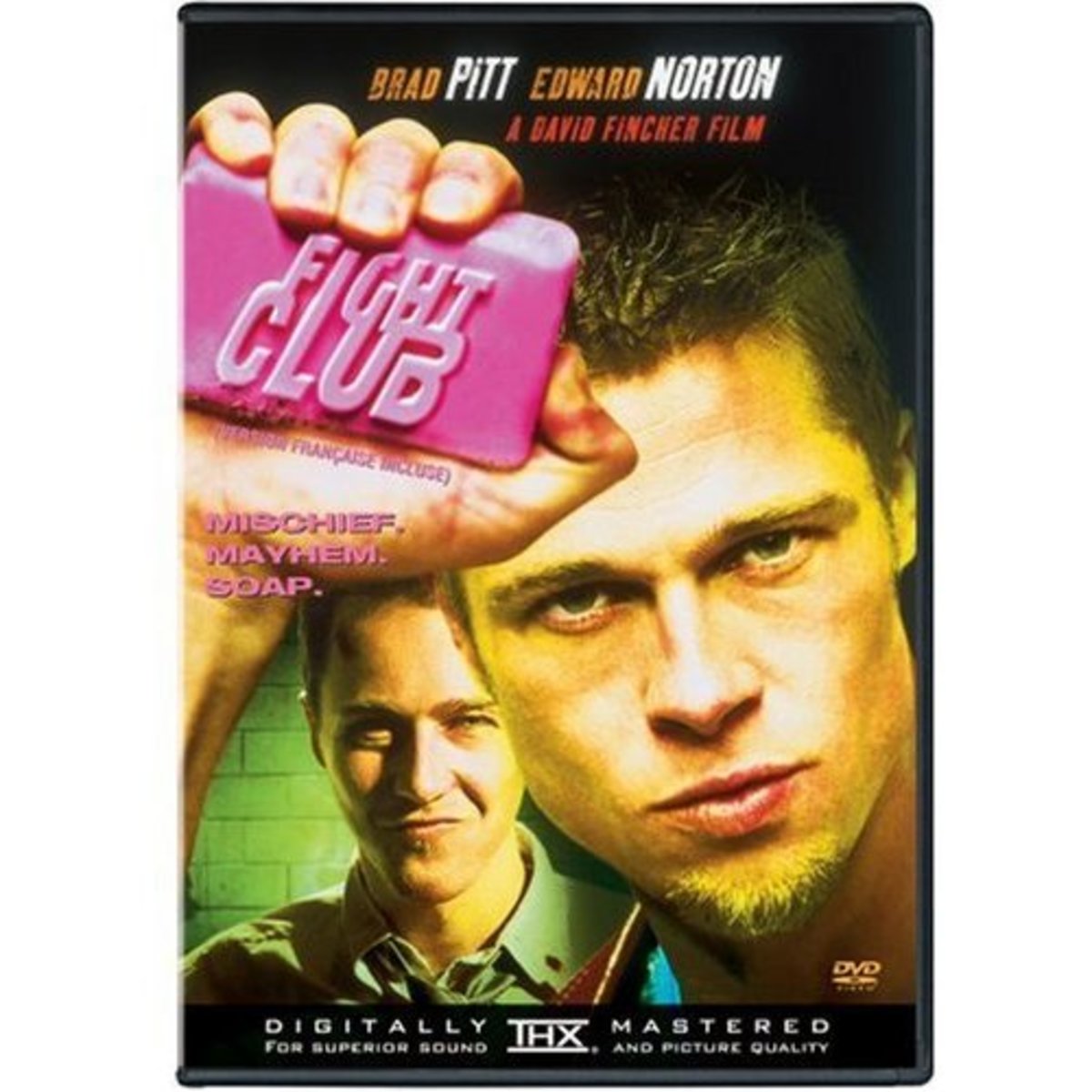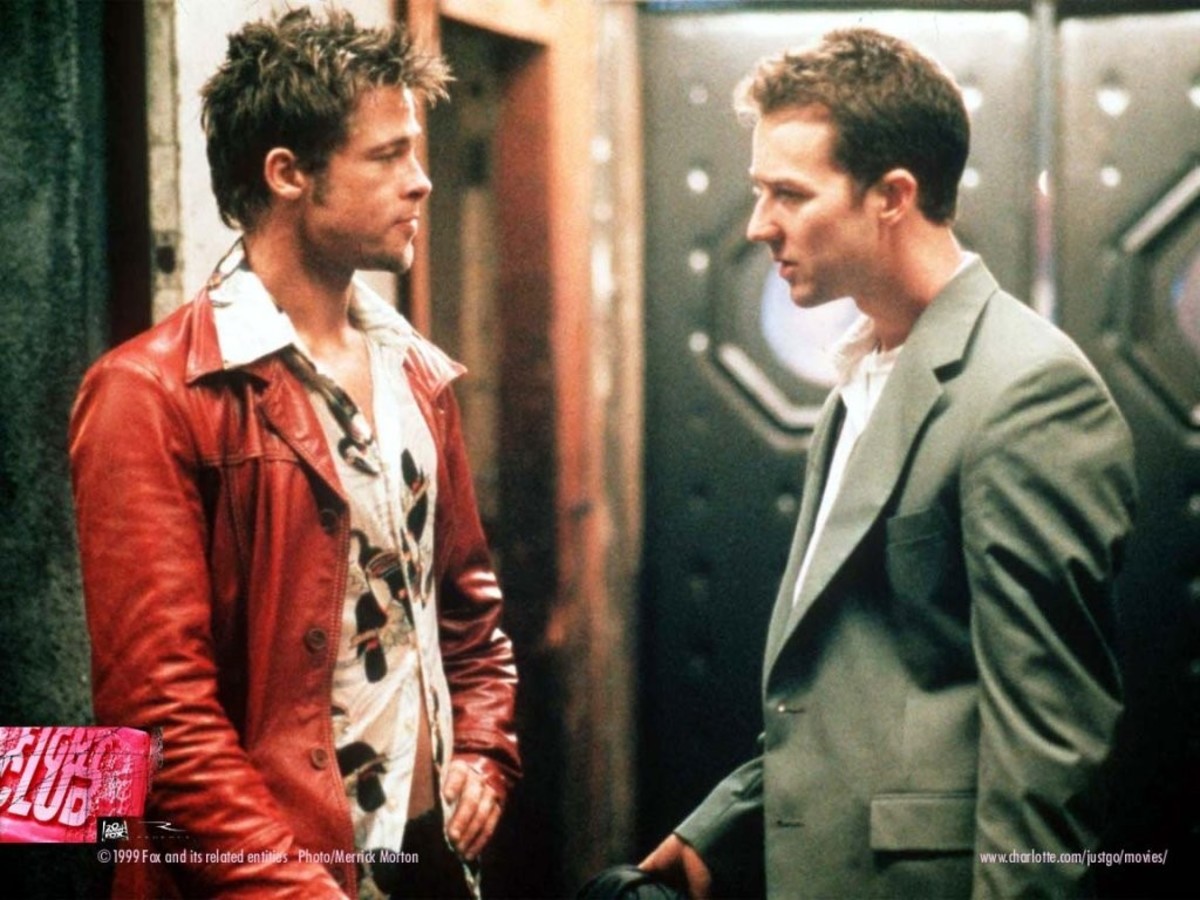Fight Club: Mischief. Consumerism. Soap.

The first image the audience sees is of Tyler Durden (Brad Pitt), holding a gun in the narrator’s (Edward Norton) mouth. Then the unnamed narrator says: “People were always asking me, did I know Tyler Durden”.
Marginality: “Content falls outside general cultural norms” (Bentley-Baker, 2010).
Tyler Durden is an iconoclastic character that the narrator (who is believed to be named Jack Moore), created amidst a concoction of mental health problems, daddy issues, and ideological internal battles with society. Tyler says that “Self improvement in masturbation. Now self-destruction…” The bulk of the content of the film addresses cultural norms almost as a theological topic. Jack, the narrator, is a normal guy who has fallen into the trap of conformity and consumerism. He believes he can truly only be complete through the acquisition of material things, specially having a good job and a nice apartment filled with IKEA furniture. After a visit at the doctor’s, he asks if he can get medications for his insomnia, to which his doctor suggests he should chew valerian root and try to get some exercise. Also, to visit a support group of men with testicular cancer so he can see what “real pain” is.

The level of marginality for the ensuing events is high; Jack meets Bob, a “man gone wrong” due to his excess use of steroids that resulted in bitch tits. He meets Marla Singer, a depressed, homeless, and unstable woman attending support groups for testicular cancer because she enjoys seeing people dealing with “an eminent death”. Then after the line “If you wake up in a different city, would you wake up as a different person?” he opens his eyes to Tyler Durden sitting next to him. Tyler Durden is the opposite of “following the formula”, he believes in a no holds, complete exploitation of everything society has marginalized people for.
Suppression: “Subject to censor, ridicule, lawsuit, or exclusion” (Bentley-Baker, 2010)
The British release of “Fight Club” had two fight scenes cut because of their grotesque, but not quite grind-house violence. There is a gory scene in which Jack, the narrator, is beating Angelface (Jared Leto) brusquely on the face, and had to be cut. The entire scene was added to the uncut version of the DVD.
This is approximately 5seconds of Angelfaces’ face:
Angelface Deleted Scene [Approx. 5 sec]


There is also a moment following a sex scene between Marla Singer and Tyler Durden in which she originally said, “I want to have your abortion” but was changed to “I haven’t been fucked like that since grade school” via the production company. The line in the book was the prior. There was ridicule about the explosive and napalm recipes given throughout the film, but those were ultimately rejected by American and British censorship. Thus, “Fight Club” ranks moderate to high in the category of suppression.
Economics: Box office flop upon release but eventually profitable (Bentley-Baker, 2010).
“Fight Club” ranks high in its box office flop success as a cult classic. David Fincher was given a budget of $63 million to make the film, but only grossed a little over $37 million. It later became profitable when a DVD was released with uncut scenes.
Transgression: Content breaks social, moral, and legal rules (Bentley-Baker, 2010).
“Fight Club” challenged and combined several thematic elements through its Drama/Thriller story. Amongst them are conformity/consumerism, psychology, existentialism, gender identities, and Buddhism.
- Conformity/Consumerism: “The things you own end up owning you”.
- Tyler Durden goes against everything known to society to be “right” as far as consumerism goes. He believes that our obsession with name brands and greed for more expensive things is what’s wrong with our society. Durden believes we are controlled by the media and the roles we are expected to live out to remain “normal” functioning parts of society. These roles reverse later in the film when conformist ideals shift to Tyler and he becomes the leader of Project Mayhem, a terrorist organization.
- Psychology: “If you wake up in a different city, would you wake up as a different person”
- Jack, the narrator, has insomnia that could be the cause of later hallucinations. He deals the best with this by attending support groups and crying.
- The father of Jack (and Tyler) is unknown, so it is unclear if there is a history of schizophrenia. In the film’s finale, we can assume that Jack does have a split personality since he’s been in charge of all of Project Mayhem as Tyler Durden all along.
- Freud’s Id, Ego, and Superego are also challenged. The Id, meeting basic needs is represented through Jack’s comfort with his life having food and shelter. The Ego, which is dealing with reality, is visible when he begins detaching from Tyler upon realizing that he is a terrorist. The Superego, which is adding morals to oneself, manifests in his attempt to shut down the explosion Project Mayhem was using to destroy the credit card buildings.
- Maslow’s Hierarchy of Needs, specifically the theory of self-actualization, has a direct link to men who have been raised without father figures and thus, are resentful. Tyler believes that freedom from controlling fathers can only be achieved by becoming fathers themselves. In other words, the film challenges the notion that you have to become what you want to defy in order to become self actualized. When Jack shoots Tyler, he has destroyed what he was trying to defy, thus, becoming self actualized.
- Existentialism: “Philosophy that an individual must make meaning from a chaotic and empty universe.”
- Fight Club was created by Jack to provide control and order to his life. Control and order from the anger felt by these men for having to comply with society’s social norms.

- Gender Identities: “A generation of men raised by women. I’m wondering if another woman is the answer we really need”.
- Chuck Palahniuk’s story, Jim Uhl’s screenplay, and David Fincher’s direction carry a satirical tone in the omission of women’s roles (in fact, there are only two women in the movie) and the gory violence amongst the men in the Fight Club fights. This tone makes its conclusion in the final scene of the movie in which Jack and Marla are holding hands while the phallic images of tall buildings are being burnt down, bringing the phallic image of a gun being held to Jack’s mouth to an end. The power of men and their corporations does not withstand the power of love and choosing to be a noble human being (since Jack has previously chosen redemption from his wrongdoings as a terrorist and to Marla).
- Buddhism:”It’s only after you’ve lost everything that you’re free to do anything”.
- “Fight Club” and The Four Noble Truths; Dukkha, which states that life is suffering is presented by the unhappiness brought upon individuals by consumerism. Samudaya, which states that Dukkha is caused by the attachment to material possession. Then there is Nirodha, which claims that Samudaya can be removed by Magga. And Magga, is the Eightfold Path.
- The Eightfold Path– Edward Norton’s character goes through a transformation with the Eightfold Path.
- “Right Understanding”; Jack is delusional, possibly schizophrenic. The world he lives in isn’t real.
- “Right Intent”; Jack does as Tyler says in spite of personal or legal laws.
- “Right Speech”; Jack treats Marla indecently and condescendingly verbally.
- “Right Action”; He assaults corporations and people.
- “Right Livelihood”; Project Mayhem becomes greater than most “normal” people.
- “Right Effort”; He does not have a positive worldwide; he is cynical.
- “Right Mindfulness”; Jack begins to realize that Tyler Durden and him have been the same person all along.
- “Right Concentration”; Jack un-clutters his mind and is able to make morally appropriate and conscious choices.
“Fight Club” challenged the social, moral, and legal rules or society through various themes. So, it gets a very high score for transgression in cult cinema.
Cult following: Generates devoted minority audience (Bentley-Baker, 2010).
Although a flop, “Fight Club” gained a large cult following. There are several sites dedicated to quotations for the film and the analysis of its characters and plot. Here are some of the fan sites still up to date:
http://www.fanpop.com/clubs/fight-club
http://www.cracked.com/article_20347_5-fan-theories-that-make-classic-movies-even-better.html
http://fightclubfan.tripod.com/
There are also sites of fan fiction:
Community:Audience is or becomes self-identified group (Bentley-Baker, 2010).
“Fight Club” became a real life phenomenon. Soon after the movie’s release, fights clubs began spreading throughout the world. So yes, the film also gets a high score in the category of community.



Quotation: Lines or dialogue become common language (Bentley-Baker, 2010).
Quotations in another category “Fight Club” gets a high rank in because it is one of the highest quoted movies from the 90’s. Here are some of its most famous quotations embedded with the image of the character who said it:


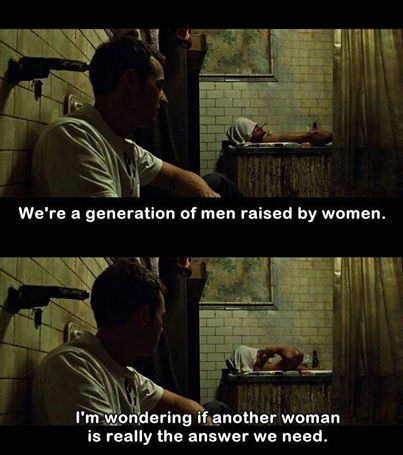
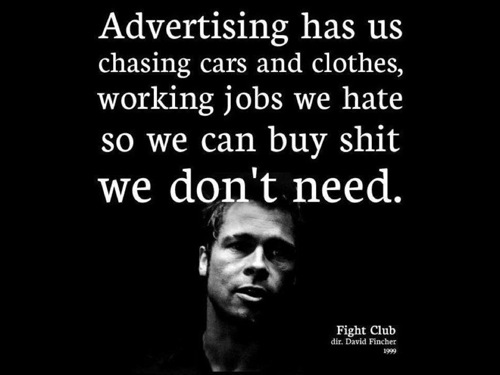
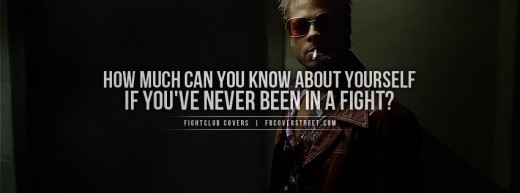

Iconography: Establishes or revives cult icons (Bentley-Baker, 2010).
“Fight Club” established solid iconography in American popular culture with its satirical views on violence, feminism, consumerism, and socio-cultural norms. As a result, it matches up to all the criteria of a model cult classic.

